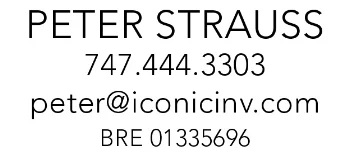Opportunity Zones – Any Value?
Written by Peter Strauss of Iconic Investments
The new hot-button selling point many agents are touting when selling apartment buildings is “Located in a Opportunity Zone.” Do you wonder what it really means? Does buying or promoting an apartment building as being in an Opportunity Zone really add any value? This article will discuss how Opportunity Zones work, and if the key selling point real estate agents promote really benefits anyone, or if it’s really just smoke and mirrors.
In December 2017, the new Federal Tax Bill created Opportunity Zones as a tool to spur economic growth in underperforming communities across the country. State governors were granted broad powers to designate certain census tracts as Opportunity Zones, with the goal of reducing poverty, encouraging new business activity, and enhancing neighborhood diversity. It was assumed that Opportunity Zones were to be limited to traditionally low income areas, such as South Central Los Angeles or Compton. Surprisingly, though, many already strong parts of cities, including parts of Westwood, Koreatown, Hollywood and East Hollywood benefit from the new tax bill.
The Opportunity Zone rules allow for reinvestment of gains into Qualifying Opportunity Funds and deferment of Federal capital gains taxes. A Qualified Opportunity Fund is an investment vehicle that is set up as either a partnership or corporation for investing in eligible property that is located in a Qualified Opportunity Zone.
How does it work? In order to qualify for Opportunity Zone tax treatment, a specific set of criteria must be met: 1) a Qualified Opportunity Fund (QOF) must be established - this can be either an LLC or corporation and must be registered as a QOF with the IRS; 2) the Qualified Opportunity Fund must acquire a property located within a census tract designated as an Opportunity Zone; 3) the property must be used as an investment vehicle - single family homes or condominium developments do not apply; 4) the most restrictive aspect of the law - the purchase can only be funded with funds subject to Federal capital gains tax.
Essentially, the Opportunity Zone law allows investors to sell capital assets such as real estate, art, stocks, bonds, vintage cars, coins, etc., that would normally be subject to capital gain or loss, and defer capital gains taxes by creating or investing in a Qualified Opportunity Fund that owns a property located inside a designated Opportunity Zone. However, the law greatly limits their reinvestment by only allowing them to roll over only those portions subject to the gain into an Opportunity Zone asset.
Here’s an example:
Joseph has a painting he bought in 1990 for $500,000. He sells the painting today for $1,500,000, of which $1,000,000 is considered gain and is subject to Federal capital gains taxes. Under the Opportunity Zone laws, Joseph can take his $1,000,000 gain (NOT the entire $1,500,000 total - only the gain portion) and invest it into an Opportunity Zone asset and defer the Federal capital gains taxes. The Federal capital gains taxes on the $1,000,000 gain must be paid by December 31, 2026.
What are the advantages? One of the benefits of using this tax advantage is that investors can defer Federal capital gains taxes provided that they reinvest the money into a QOF within 180 of the original sale date. The only caveat is that capital gains taxes on profits must be paid no later than December 31, 2026.
The true benefit of investing in an Opportunity Zone project comes to light if you hold a property for 10 or more years. At and after the 10-year mark, the IRS will allow you to increase the basis of the property acquired in the Opportunity Zone to fair market value at the time of sale. Having a stepped-up basis eliminates all Federal capital gains tax owed – your profits are tax free.
What’s the downside? Sounds too good to be true? It probably is if you’re considering purchasing apartment buildings. Iconic spoke with the Internal Revenue Service department focused on Opportunity Zone Investments and learned one key factor that agents probably aren’t talking about. The Opportunity Zone law states that for an existing apartment building to qualify for QOF treatment, a buyer must make capital improvements that exceed 101% of the purchase price. This is beyond almost any value-add proposition unless you intend to renovate your units with gold faucets.
The Opportunity Zone treatment doesn’t create any value for existing apartment buildings – unless the intention of the buyer is to demolish the existing structure and erect a new building.


